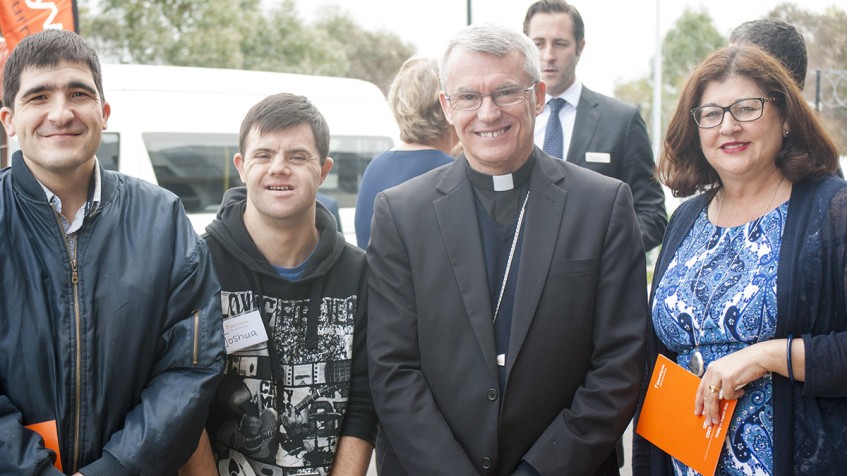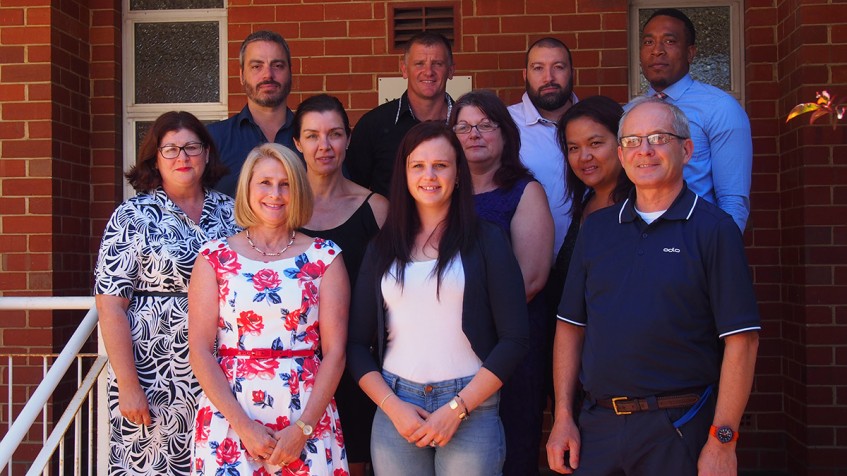Government must deliver for people with disability

Archbishop Costelloe with Identitywa CEO Marina Re in 2016. Marina Re explained that a number of NDIS participants who require 24/7 support have experienced significant cuts in the hours within support plans. Photo: The Record.
There is growing fear among Catholic providers of disability services that the National Disability Insurance Scheme (NDIS) will not deliver the level of support that clients and providers need.
Catholic Social Services Australia (CSSA), many of whose members offer services through the NDIS, has said while there was a sense of relief that a plan to implement independent assessments was scrapped, key issues remain.
Chief among those concerns is the gap – which appears to be growing – between what services are funded for through the NDIS and what providers charge.
“There is a sense of déjà vu emerging, with it feeling like what happened to Medicare is happening to the NDIS,” said Chair of Catholic Social Services Australia, Francis Sullivan.
“The gap being created is leaving NDIS clients and their families out of pocket and that cannot continue.”
Mr Sullivan stated while that challenge has been building for some time, the COVID-19 pandemic has created additional problems.
“With large parts of the country currently in lockdown, and some regions moving in and out of lockdowns for 18 months, some clients cannot access the services they need,” he said.
“Health services and supports are being offered, but other vital supports, such as access to community, civic and social participation, are not.”
Identitywa CEO Marina Re explained that a number of NDIS participants who require 24/7 support have experienced significant cuts in the hours within support plans.
“This is a concern as it impacts directly on the quality of care that can be provided to people with complex needs,” Marina said.
“Families often express concern about the difficulty in navigating the planning process, are often not consulted about changes in NDIS plans and experience long delays in getting decisions,” she said.
Marina continued by saying that the majority of people supported by Identitywa within their houses are ageing and their needs are becoming more complex.
“There is no justification for reducing support. Plans needs to be maintained and participants and families want certainty that supports will continue.

Identitywa CEO Marina Re (left) pictured with Identitywa support workers in 2017. Marina said that the majority of people supported by Identitywa within their houses are ageing and their needs are becoming more complex. Photo: Supplied.
“We have seen a deterioration in support hours over the past 12 months.
“As plans are reviewed on an annual basis there can be a loss of up to 10% of support hours within any justification or consultation,” she said.
Lockdowns are also seeing some annual assessments cancelled or delayed, meaning people’s plans are being rolled over.
For some this creates no issue, but for many that means approved goals and funds no longer meet the needs of the client, seeing the additional costs to clients escalate.
Catholic providers are also expressing significant workforce concerns, Mr Sullivan said.
“It can be very difficult to attract and retain quality staff in the disability section, largely due to the casualisation of the workforce,” he said.
“People are being turned off the profession they have trained for and practised in all their lives because they are being forced to work as a casual. Working under those conditions means they are forgoing the security of a full-time job.”
He said that’s especially a problem for workers in their 50s who are preparing for retirement.
“If they currently have no sense of certainty about their employment, you cannot blame them for seeking security in another role that does offer it.”
Those factors create a system that isn’t delivering for providers, their staff or – most importantly – clients.
“The aspirations of the NDIS are commendable. We want it to work, but it is not working the way is could and should,” Mr Sullivan said.
Marina concluded by saying some families are very concerned and worried about the future.
Many families are experiencing a high degree of fatigue with frequent contact with the NDIS and requirements to submit reports and assessments.
